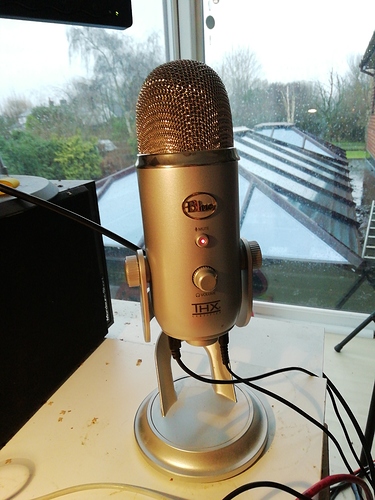The latest USB connected device…
A blue yeti USB microphone (with headphone output)
Standard USB device but hw:1 and alteration to /etc/dbus-1/system-local.conf
I get audio in the phones from the zynth… Not so sure about input yet …
-P 70 -t 2000 -s -d alsa -d hw:1 -r 48000 -p 256 -n 2 -X raw
root@zynthian-nord:~# amixer
amixer: Mixer attach default error: No such file or directory
root@zynthian-nord:~# aplay -l
**** List of PLAYBACK Hardware Devices ****
card 1: Microphone [Yeti Stereo Microphone], device 0: USB Audio [USB Audio]
Subdevices: 0/1
Subdevice #0: subdevice #0
root@zynthian-nord:~#
Just for my benefit…
-P, --realtime-priority int
When running --realtime, set the scheduler priority to int.
-t, --timeout int
Set client timeout limit in milliseconds.
The default is 500 msec.
In realtime mode the client timeout must be smaller than
the watchdog timeout (5000 msec).
-s, --softmode
Ignore xruns reported by the ALSA driver.
This makes JACK less likely to disconnect
unresponsive ports when running without --realtime.
-d, --device name
The ALSA pcm device name to use. If none is specified,
JACK will use "hw:0",
the first hardware card defined in /etc/modules.conf.
-r, --rate int
Specify the sample rate. The default is 48000.
(not to be confused with --no-realtime (…?)
-p, --port-max n
Set the maximum number of ports the JACK
server can manage. The default value is 256.
-n, --nperiods int
Specify the number of periods of playback latency.
In seconds, this corresponds to
--nperiods times
--period divided by
--rate.
The default is 2, the minimum allowable.
For most devices,there is no need for any
other value with the --realtime option.
Without realtime privileges
or with boards providing
unreliable interrupts (like ymfpci),
a larger value may yield fewer xruns.
This can also help if the system is not tuned for
reliable realtime scheduling.
For most ALSA devices, the hardware buffer
has exactly --period times --nperiods frames.
Some devices demand a larger buffer.
If so, JACK will use the smallest possible buffer
containing at least --nperiods,
but the playback latency does not increase.
For USB audio devices it is recommended
to use -n 3.
Firewire devices supported by FFADO
are configured with -n 3 by default.
-X, --midi [seq|raw]
Specify which ALSA MIDI system to provide access to.
Using raw will provide a set of JACK MIDI ports
that correspond to each raw ALSA device on the machine.
Using seq will provide a set of JACK MIDI ports
that correspond to each ALSA "sequencer" client
(which includes each hardware MIDI port on the machine).
raw provides slightly better performance but does not permit
JACK MIDI communication with software written
to use the ALSA "sequencer" API.
 .
.
 Dirk
Dirk